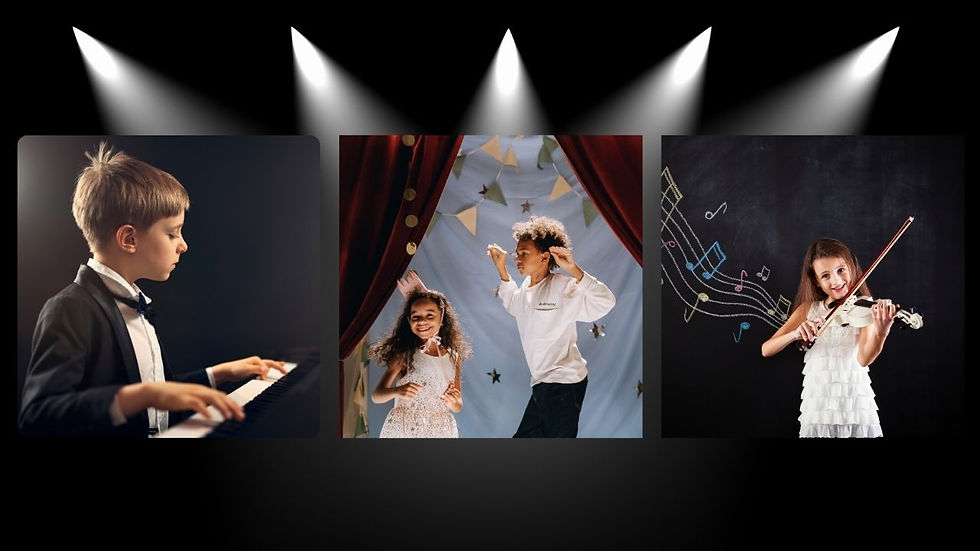The Unlikely Non-Cognitive Benefits of a Performing Arts Education
- Seimpi
- Aug 29, 2024
- 3 min read
One might typically evaluate the benefits of a performing arts education primarily in its capacity to improve one’s cognitive skills as well as to engender academic success. Much ink has been spilled over the ability of performing arts training to improve children’s thinking, reasoning, and remembering skills, which are important cognitive skills required by academic subjects like English, Mathematics, and Science.

However, a recent study suggests that this may not be the only tie between a performing arts education and academic achievement. A study just published in Nature Human Behaviour, jointly led by Dr. Margherita Malanchini at Queen Mary University of London and Dr. Andrea Allegrini at University College London et. al. (2024) found that non-cognitive skills — such as self-regulation, motivation, and conducive personality traits — increasingly predict academic achievement across an adolescent’s schooling years.

The study concludes that the fostering of such non-cognitive skills may play an important contributing role towards successful educational achievements and interventions in a child’s life. The research suggests that fostering non-cognitive skills alongside cognitive abilities could significantly improve educational outcomes. It then follows that a performing arts education stands to additionally benefit one’s academic performance in terms of the non-cognitive skills it cultivates.

What sorts of non-cognitive skills, then, might an exposure to performing arts confer? Here are some potential non-cognitive benefits of a performing arts education:
Self-Regulation: A study by Kliewer et. al. (2011) showed that a creative writing-based intervention programme reduced aggressive behaviour from at-risk students from several American neighbourhoods. Similarly, a performing arts education may improve one’s ability to self-regulate one’s behaviour and impulses by providing a healthy outlet for self-expression and creativity.
Motivation: The performing arts can give one confidence in one’s own abilities and thereby cultivate a greater motivation to excel at whatever one puts one’s mind towards. A study by Manorothkul (2021) suggests that exposure to a performing arts education is positively correlated with a higher level of self-efficacy.
Emotional Intelligence: Performing to an audience in addition to performing with others develops one’s social and communication skills as well as sense of empathy. Several psychological studies, such as one by Clark (2006), indicate that a fine arts education, especially ones in dance and music, lead to higher scores on tests of emotional intelligence.
Healthy Behaviour: A study by Root Wilson (2009) suggests that an arts education is correlated with an increased uptake of certain ‘health-enhancing’ behaviours such as dieting, exercising, and seatbelt-wearing. Exposure to performing arts training may lead to an overall improved level of physical and mental wellness for one.
In total, training in the performing arts confers a variety of non-cognitive advantages for children, which in turn further translates into advantages in their academic lives. Indeed, apart from ‘hard’ cognitive skills, one requires ‘soft’ non-cognitive skills to succeed academically as well. With that being said, non-cognitive skills are not just valuable in a schooling, educational context but are also good in and of themselves. Non-cognitive skills like motivation and emotional intelligence are required to tackle a variety of challenges in all stages of one’s life, such as managing interpersonal relationships as well as one’s physical and mental wellbeing. Therefore, in a performing arts education, parents not only set their children up for academic success but also for success in the rest of their lives as well.

References:
● Malanchini, M., Allegrini, A.G., Nivard, M.G. et al. Genetic associations between non-cognitive skills and academic achievement over development. Nat Hum Behav (2024). https://doi.org/10.1038/s41562-024-01967-9.
● Kliewer W, Lepore SJ, Farrell AD, Allison KW, Meyer AL, Sullivan TN, Greene AY. A school-based expressive writing intervention for at-risk urban adolescents' aggressive behavior and emotional lability. J Clin Child Adolesc Psychol (2011).

Comentários